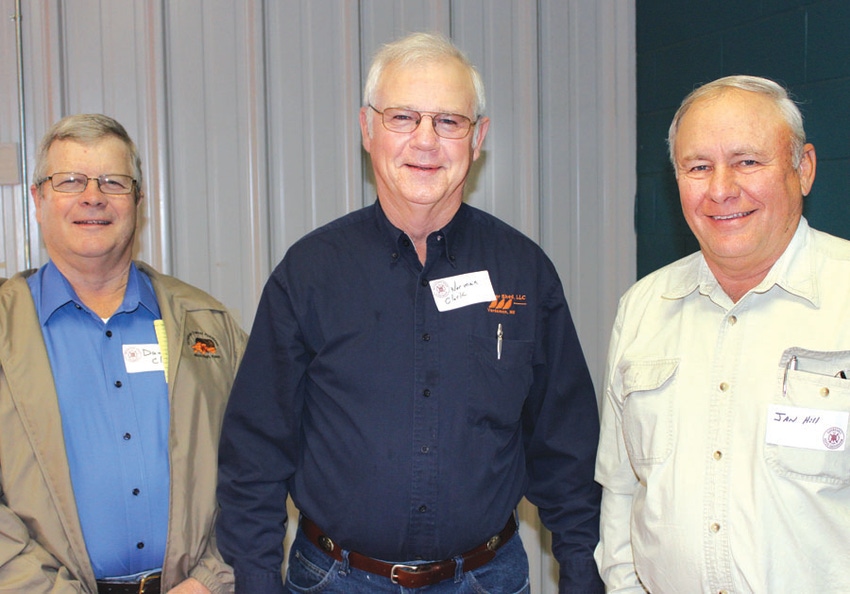
North Mississippi producers weigh in on Extension/research needs
The Producer Advisory Council offers "a way to have a one-on-one dialogue about what northeast Mississippi producers see as priority needs and to get their views on issues of importance in research and Extension,” says Bill Herndon, professor and head of the Northeast Mississippi Regional Extension Center at Verona, where this year’s council meeting was held.

For more than half a century, producers in northeast Mississippi have met annually with Extension and research leaders to discuss ways to improve production and efficiency in the region.
“It’s a way to have a one-on-one dialogue about what producers see as priority needs and to get their views on issues of importance in research and Extension,” said Bill Herndon, professor and head of the Northeast Mississippi Regional Extension Center at Verona, where this year’s Producer Advisory Council meeting was held.
“We value these opportunities to get feedback from our growers and stakeholders as to how we can better address research and outreach needs,” he told the 300 or so farmers, agribusiness representatives, and community leaders in attendance. “We take very seriously the suggestions and ideas that are presented at these events.”
George Hopper, dean and director of Mississippi State University’s College of Agriculture and Life Sciences and College of Forest Resources, Agricultural and Forestry Experiment Station, and Forest and Wildlife Research Center, agreed that, “This process of your providing us with advice and suggestions is important to help us to stay relevant and true to our mission.
“We have an impressive amount of research going on to advance agriculture and forest interests in this region of the state and to help them be more profitable and competitive. Our producers are leaders for agriculture, forestry, community development, and resource development, taking care of our land, water resources and developing this region.”
The nation and the state are “going through some tough times” economically, Hopper said, and that has had an impact on Land Grant institutions such Mississippi State University.
“But MSU has a rich tradition of programs for the advancement of our state, and we’re going to stay true to that course.
“The Mississippi legislature is in now session, working on budgets and priorities, and I’ve just been in Washington, where leaders are trying to find the funding for everything that needs to be done.”
But, Hopper said, “There just aren’t enough resources for everything. So, we have to set priorities, streamline everything we can, and allocate resources to those areas with the highest priorities.
“The research we have under way in the northeast Mississippi area is very good, but we continue to need your help in telling us what you think are the highest priority issues. We listen closely to what you have to say, and history has shown that we’re responsive to your suggestions.
“We also need your support in telling the legislature and your representatives in Washington how important your land grant university, Extension, and our experiment stations are to your continued success in farming.
“We also need your sons and daughters,” Hopper said. “Please continue to send them to us — we need them to bring their energy and enthusiasm to agriculture and forestry in order to meet the challenges of a very demanding future.”
Currently, he said, there are about 1,800 in Mississippi State University’s College of Agriculture and Life Sciences and about 500 in the College of Forest Resources aspiring to careers in agriculture and forestry.
Among recommendations made by producer committees in the row crops sector:
· Cotton: “We’d like more LibertyLink varieties and expansion of weed resistance research,” said Joe Camp. “We’d also like to see a program for monitoring resistance in plant bubs in the hill areas of the state, and a continuation of variety trials and on-farm trials.
“Although cotton is one of the most-researched crops, there is still much we don’t know about it. Things are changing so fast, and it takes big-time money to grow the crop — so we need to know how to get the most out of every dollar we invest in it.”
· Grains: “We need more studies on corn following corn, both in dryland and irrigated systems,” said Bobby Moody. “We’d also like to see economic comparisons of poultry litter versus commercial fertilizer, quality studies on poultry litter, and how litter reacts on grain crops.
“We’d like training in herbicide application and more studies of their effects on target weeds and the crop, and we’d like to see a resumption of breeding programs for conventional soybean varieties.”
· Peanuts: “Growers would like to see more seed variety trials specific to north Mississippi,” said Reid Nevins, “as well as development of new seed types for this area.
“They would also like more information on fertilizer types and rates, particularly for poultry litter versus commercial fertilizer, and on foliar fertilizers, calcium, and other nutrients, along with studies on optimum seed spacing.”
· Sweet potatoes: “We would like to see more research into identifying pathogens in the tip rot disease complex,” said Benny Graves, speaking for the state’s more than 100 growers.
“Also, we’d like more studies and grower education on nematode control strategies; more weed control research, particularly for pigweed and nutgrass; and maintaining the virus-tested sweet potato seed stock program.
“And we’d like to see the university fill the position of sweet potato specialist.”
About the Author(s)
You May Also Like



